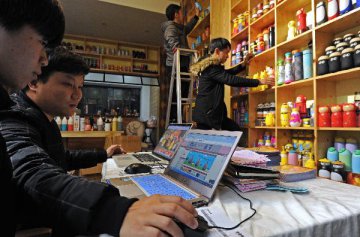
Data from the National Bureau of Statistics (NBS) shows that the total retail sales of consumer goods in January and February came at 5,796 billion yuan, representing a nominal growth of 9.5 percent year on year. The growth rate was down 0.7 percentage points over the same period last year, the lowest level in nearly 14 years. To solve the problem of slowdown in consumption, China will introduce more consumer policies this year. According to the requirements on the 2017 national economic development plan, it will launch ten actions to expand consumption.
"We should further improve the ideas and ways for macro-control, promote the smooth operation of the economy, maintain a steady growth in consumption and continue to expand consumption," He Lifeng, director of the National Development and Reform Commission (NDRC) said at the 2017 China Development Forum on March 19.
NBS data shows that the total retail sales of consumer goods in January and February came at 5,796 billion yuan, representing a nominal growth of 9.5 percent year on year. The growth rate was down 0.7 percentage points over the same period last year, the lowest level in nearly 14 years (calculated on a monthly basis, yet the figure for January and February is an accumulated value because of seasonal factors).
To solve the problem of slowdown in consumption, China will introduce more consumer policies this year. For example, according to the requirements on the 2017 national economic development plan, it will launch ten actions to expand consumption, including smoothing commodity sales in cities and towns, upgrading consumption in rural areas and improving residential housing.
Zhao Ping, head of the Department of International Trade of the China Council for the Promotion of International Trade Academy (CCPIT Academy), pointed out that the GDP (total regional GDP) growth target in 2017 was reduced to around 6.5 percent. This will have an impact on the expected growth of the resident income, which will later affect expectations of consumer spending and eventually the consumption growth.
Consumption growth slows down in Jan. and Feb.
According to the recently published 2016 national economic and social development plan operation and the 2017 national economic and social development plan, the total retail sales of consumer goods in 2017 is expected to grow by around 10 percent, down from the around 11 percent target last year.
The cut of the goal is mainly because that the targets for economic growth, investment, broad money have all declined from 2016. Specifically, the 2017 GDP growth target is about 6.5 percent, lower than the 6.5-7 percent growth target a year earlier. The investment and broad monetary growth target was 9 percent and 12 percent, respectively, down from last year’s growth target of 10.5 percent and 13 percent.
Therefore, it is not a surprise to lower this year’s consumer target. Actually, the consumption growth has already slowed down.
Data shows that in January and February, China’s total retail sales of consumer goods increased 9.5 percent year on year, the lowest since June 2003 (calculated on a monthly basis, yet the figure for January and February is an accumulated value because of seasonal factors). In breakdown, the retail sales of automobile recorded at a negative growth of 1 percent. It is learnt that from January to February 2016, the auto retail sales expanded 5.4 percent. The decline in auto retail sales dragged down about 0.7 percentage points growth in the total retail sales of consumer goods in this January and February.
Lin Tao, senior statistician at the Department of Foreign Trade of the NBS, analyzed, that as China said that it would scrap the policies of exempting half purchase tax for small-displacement car at the beginning of this year, car sales had increased remarkably at the end of last year. Overdraft consumption led to a negative growth in car consumption at the beginning of this year. Excluding auto sales, the total retail sales of consumer goods growth rate was basically unchanged from the same period last year.
Hong Tao, head of the Institute of Commercial Economics of Beijing Technology and Business University, pointed out that there are some reasons for the current slowdown in consumption growth. The circulation field is now transforming to speed-, quantity- and product-oriented one to efficiency-, quality- and brand--oriented one. He believed that it is normal for consumption growth to slow down in the process of restructuring.
The 21st Century Business Herald learnt that the resident income growth has also has slowed down. In 2016, the actual growth rate of resident income was 6.3 percent, 0.4 percentage points lower than GDP growth rate.
Wang Xianqing, director of the Institute of Circulation Economics, Guangdong University of Finance and Economics, pointed out that if residents' disposable income is lower than GDP, it will restrict consumption. Once the resident’s expected income declines, it will restrict their desire and choices for consumption.
NDRC will introduce measures to expand consumption
The NDRC will introduce a series of measures so that the slowdown in consumption growth will not bring adverse effects to the economy.
According to the recently published 2016 national economic and social development plan operation and the 2017 national economic and social development plan (which has been adopted by the People's Congress), China will launch ten actions to expand consumption, including smoothing commodity sales in cities and towns, upgrading consumption in rural areas and improving residential housing, promoting automobile consumption, upgrading the tourism and leisure industry, improving the scope and quality of housekeeping service, making innovations in education, cultural and information consumption, expanding consumption in sports and fitness consumption, expanding green consumption and improving the quality of consumption environment.
As house prices in some cities have continued to go upward since 2016, some cities launched two rounds of home-buying restrictions from Sept. 30, 2016 to March 18 this year. The crowding-out effect of high house prices on consumption cannot be ignored either.
Zhao Ping, head of the Department of International Trade of the CCPIT Academy, believed that high house prices may inhibit consumption to some extent. High house prices have affected the consumption to a certain extent in a short period of time, but that also means there will be higher investment yields.
"Because the consumption itself is rigid, when it reaches a certain level of consumption, even if the income has been affected, the consumption will remain unchanged or even increase further," Zhao said.
Hong believed that next China should not only encourage domestic consumption but also cannot limit consumption abroad. China needs to establish a scientific consumption system which will neither encourage excessive consumption nor curb consumption. It should be a sustainable consumption system which not only encourages rational, green, ecological and moderate consumption but also provides effective consumption supply.
Translated by Coral























Latest comments